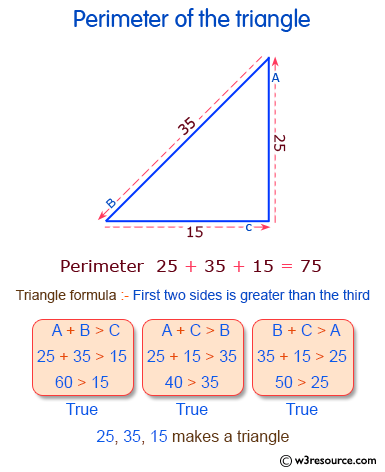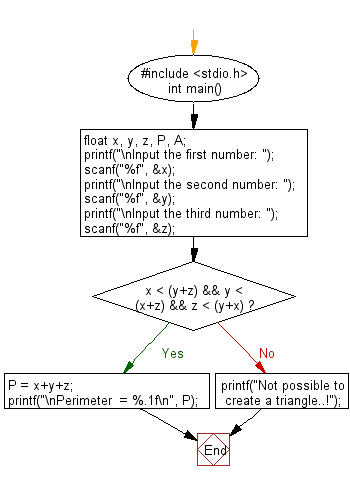C Exercises: Calculate the perimeter of the triangle
C Basic Declarations and Expressions: Exercise-23 with Solution
Write a C program that reads three floating values and check if it is possible to make a triangle with them. Also calculate the perimeter of the triangle if the said values are valid.
Pictorial Presentation:

C Code:
#include <stdio.h>
int main() {
float x, y, z, P, A;
printf("\nInput the first number: ");
scanf("%f", &x);
printf("\nInput the second number: ");
scanf("%f", &y);
printf("\nInput the third number: ");
scanf("%f", &z);
if(x < (y+z) && y < (x+z) && z < (y+x))
{
P = x+y+z;
printf("\nPerimeter = %.1f\n", P);
}
else
{
printf("Not possible to create a triangle..!");
}
}
Sample Output:
Input the first number: 25
Input the second number: 15
Input the third number: 35
Perimeter = 75.0
Flowchart:

C Programming Code Editor:
Contribute your code and comments through Disqus.
Previous: Write a C program that read 5 numbers and sum of all odd values between them.
Next: Write a C program that reads two integers and checks if they are multiplied or not.
What is the difficulty level of this exercise?
Test your Programming skills with w3resource's quiz.
C Programming: Tips of the Day
Static variable inside of a function in C
The scope of variable is where the variable name can be seen. Here, x is visible only inside function foo().
The lifetime of a variable is the period over which it exists. If x were defined without the keyword static, the lifetime would be from the entry into foo() to the return from foo(); so it would be re-initialized to 5 on every call.
The keyword static acts to extend the lifetime of a variable to the lifetime of the programme; e.g. initialization occurs once and once only and then the variable retains its value - whatever it has come to be - over all future calls to foo().
Ref : https://bit.ly/3fOq7XP
- New Content published on w3resource:
- HTML-CSS Practical: Exercises, Practice, Solution
- Java Regular Expression: Exercises, Practice, Solution
- Scala Programming Exercises, Practice, Solution
- Python Itertools exercises
- Python Numpy exercises
- Python GeoPy Package exercises
- Python Pandas exercises
- Python nltk exercises
- Python BeautifulSoup exercises
- Form Template
- Composer - PHP Package Manager
- PHPUnit - PHP Testing
- Laravel - PHP Framework
- Angular - JavaScript Framework
- Vue - JavaScript Framework
- Jest - JavaScript Testing Framework
